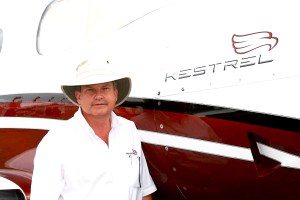AUGUSTA — Wisconsin appears to have won the bidding war for most of the promised 600 new manufacturing jobs originally expected to come to Maine.
Wisconsin Gov. Scott Walker announced Monday that Kestrel Aircraft Corp. will establish its manufacturing and business headquarters in Superior, Wis. The company had planned to locate its facility in Brunswick at the recently decommissioned Brunswick Naval Air Station. However, the startup had also been approached by other states after CEO Alan Klapmeier sought additional financing.
Klapmeier in December met with Gov. Paul LePage and members of his administration to discuss ways to keep the aircraft manufacturing company in Brunswick. However, there were signs last week that those efforts were running up against stiff competition.
On Monday, Walker announced that his administration had delivered a financing package that would bring Kestrel to Superior.
Klapmeier said his inability to obtain additional tax credits from Maine forced him to consider other locations. In November, The Forecaster reported that Kestrel was eyeing a manufacturing facility in Berlin, N.H., after Klapmeier appeared in a report by New Hampshire Public Radio.
Kestrel had hoped to fund a portion of its $100 million project through Coastal Enterprises, a Wiscasset-based private, nonprofit community development institution, and the federal New Market Tax Credit program. The program helps bring jobs and investments into low-income or distressed areas, as identified in the U.S. Census.
Kestrel hoped to receive $39 million in tax credits, but only received a fifth of the amount it was seeking. In April, the company was allocated $7.8 million in tax credits, enough to get Kestrel Aeroworks, the maintenance and repair operation, off the ground, but not enough to start manufacturing airplanes.
News of the financing struggles prompted renewed efforts by state officials to keep Kestrel in Brunswick.
Last week, LePage highlighted the state’s effort to support Kestrel, including a $300,000 Community Development Block Grant, a lease write-down rate that carries a value of $250,000 per year, a local property tax exemption carrying a value of $105,000 per year, $750,000 in direct building improvements and commitment from the Midcoast Regional Redevelopment Authority to issue $10 million in tax revenue bonds.
With those commitments already made, the LePage administration sought additional information from Kestrel before sweetening the pot with gap financing. The latter would have allowed the startup to obtain additional tax credits during the new application cycle.
“All that is left is for our team to receive updated and thorough financial information from Kestrel,” LePage said last week in a statement. “As governor, it is my responsibility to ensure prudent use of Maine’s business development programs.”
The company had planned to lease one of the former U.S. Navy base’s prime locations, the state-of-the-art Hangar 6. The company’s plan to build a single-engine turboprop in Brunswick had excited state officials, who touted the company’s promise of 600 jobs.
Peter Rogers, LePage’s communications director, said the governor and his economic development staff were disappointed by the announcement.
Rogers said LePage had spoken with Klapmeier several times during the last few weeks. He said the governor wanted financial data from the Kestrel before green-lighting “a generous” funding package.
Rogers said Kestrel never provided that data.
“The governor takes his duty as the state’s financial steward,” Rogers said. “This package has been in place for a long, long time. It’s disappointing because staff had worked hours and hours to negotiate the funding package.”
“The governor is a businessman and he wanted to see (Kestrel’s) financial information before moving forward,” Rogers said.
George Gervais, commissioner of the state Department of Economic and Community Development, said the gap financing was made available to Kestrel weeks ago, but the company didn’t supply the required financial data to complete the application.
“The gap financing was on the table for quite awhile,” Gervais said. “When they didn’t respond it became clear to me that they were looking elsewhere. They were just further down the road than I thought.”
Gervais also refuted claims that the administration hadn’t done its part to keep Kestrel in Maine. He said the state had fulfilled all of its promises to the company.
Gervais noted that unlike Wisconsin, which has a quasi-public agency to distribute the tax credits Kestrel sought, Maine had no say in how the federal credits were distributed.
Kestrel’s agreement with the redevelopment authority in Brunswick requires it to maintain a portion of its business here. Gervais said the company, which already employs 25 people in the town, could create up to 100 jobs there.
“Maine will still get a piece of the pie, but now we’re splitting the pie with Wisconsin,” Gervais said.
Maintaining a presence in Maine will also allow the company to keep some of the financing it’s received, including the $300,000 CDBG funds that it was just awarded. CDBG funding contains job-creation mandates.


Comments are no longer available on this story